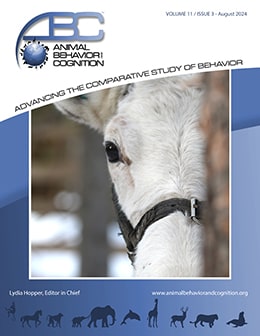Vol 11, Issue 3, August 2024
For the Sake of Curiosity: Humans but not Capuchins (Sapajus apella) Collect Counterfactual Information on a Computerized Gambling Task
Citation
Haseltine, E. L., & Beran, M. J. (2024). For the sake of curiosity: Humans but not capuchins (Sapajus apella) collect counterfactual information on a computerized gambling task. Animal Behavior and Cognition, 11(3), 252-269. https://doi.org/10.26451/abc.11.03.02.2024
Abstract
Counterfactuals are alternative outcomes to past events. Curiosity for the counterfactual acts as an important driver of learning under uncertainty and helps to improve on past behaviors by informing future choices. Humans have demonstrated the desire to collect counterfactual information when it is perceived as useful, during times of uncertainty, and even when it comes at a cost. The comparative literature on counterfactual use and curiosity is small but suggests that rhesus macaques may possess similar tendencies to humans. The goal of the current study was to add a new species, capuchin monkeys (Sapajus apella), to the comparative counterfactual literature and to test capuchins and humans on nearly identical tasks. This study involved a three-choice gambling task that consisted of one hidden and two visible reward values. Visible reward values were always equivalent but had differently colored borders to indicate whether participants would view the counterfactual information associated with the gamble or not on trials when they chose not to gamble. Only humans showed evidence of counterfactual curiosity and collected the information at levels different than chance. Humans also collected counterfactual information significantly more than capuchins, indicating a species difference. However, it is not clear whether this difference is simply due to the capuchins’ lack of curiosity surrounding this particular task or whether there is a broader species difference for seeking counterfactuals resulting from different evolutionary histories of these species.
Keywords
Counterfactual, Curiosity, Capuchin monkeys, Gambling, Decision making, Comparative cognition
